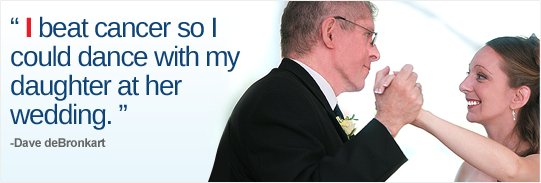"e-Patient Dave" deBronkart


I Danced at My Daughter’s Wedding
Dave deBronkart survived stage IV cancer with the help of information he found on an online network for cancer patients. Now he blogs as “e-Patient Dave,” writing about how patients can use information including EHRs to participate in their own health care. Here is his story.
I got interested in health care the hard way. I went to my doctor with a sore shoulder and got an x-ray. And on Jan. 3, 2007, the phone rang and it was my doctor. He said, “Dave, your shoulder’s going to be fine, but there’s something in your lung.” It turned out to be stage IV kidney cancer.
I’ve been online since 1989, so I went home and started searching for quality information. I went to some respected medical websites. I read that the median survival time for my condition was 24 weeks. This was bad. I was facing the grave. I had to sit down with my daughter and her boyfriend and say, “I don’t want you to get married prematurely, just so you can do it while I’m still alive. But this is really serious.”
Online Research Uncovers a Cure
My doctor prescribed a patient community, www.acor.org ![]() , which is a network of cancer patients. Very quickly, these other patients told me I should go to a specialist center. They told me about a treatment that occasionally works, called high-dosage interleukin-2. And someone emailed me a list of four doctors in my part of the country who offer this treatment, along with their phone numbers. How amazing is that? The interesting thing is, it’s several years later now, but you still can’t find a website that gives a patient that same information. It turns out that patients know what other patients want to know. That’s the power of patient networks.
, which is a network of cancer patients. Very quickly, these other patients told me I should go to a specialist center. They told me about a treatment that occasionally works, called high-dosage interleukin-2. And someone emailed me a list of four doctors in my part of the country who offer this treatment, along with their phone numbers. How amazing is that? The interesting thing is, it’s several years later now, but you still can’t find a website that gives a patient that same information. It turns out that patients know what other patients want to know. That’s the power of patient networks.
I got two rounds of interleukin-2 two months apart, and the tumors started to shrink. A year and a half later, I was there when a magnificent young woman, my daughter, got married. There was a moment, right before the ceremony started, when it was just the two of us standing together. And at that moment, I was so glad that she didn’t have to say to her mother, “I wish Dad could have been here.” That moment is what we’re actually accomplishing when we make health care better.
Patients Have the Power to Improve Health Records
I almost died, and here’s what I discovered: Patients are the most underutilized resource in all of health care. So after I recovered, I decided to create my own personal health record. I transferred my medical records from my hospital’s computer system, and guess what? Those records contained conditions I never had, an allergy I never had, and did not contain an allergy I do have. At the same time, my records were missing a lot of important data, like lab results and radiology reports. What if an unfamiliar doctor or nurse had relied on those records?
Patients can help. We can be a second set of eyes on our medical records. I corrected the mistakes in my health record, but many patients don't understand how important it will be to have correct medical information, until the crisis hits. Better to clean it up now, not when there’s time pressure.
What patients need most – what I want to see – is health information exchange between doctors, or HIE. When you go to buy a car, they can pull up your entire credit report. But if I go to a hospital emergency room, they can't see the medical records of my doctor who is three states away – or even next door. That's why we need HIE. And it’s not just that we need it: How can health professionals make the most of their training and experience, if they don’t have complete information?
We have the power to improve health care through better quality information, delivered to the person who needs it, when they need it. It’s my mission now to tell patients: Get involved – you have more ability to improve health care than you would ever imagine.

